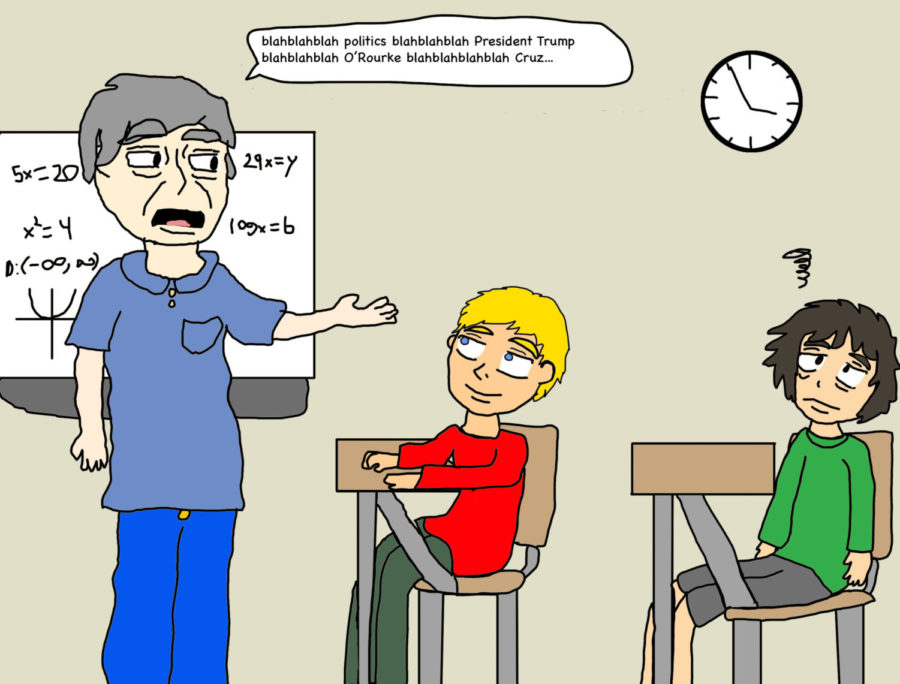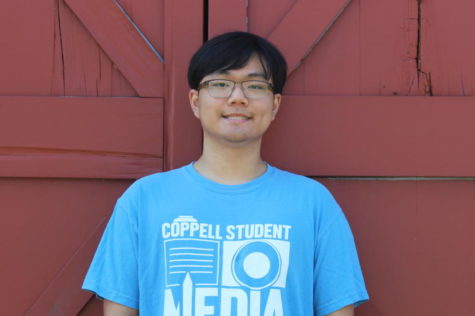A starting point
Teachers’ opinions in classroom develop basis for future student participation in politics
When a teacher gives his/her opinion in class, some students zone out, while others listen intently. Pranske thinks that teachers’ opinions are beneficial to the students’ future political involvement. Graphic by Ryan Kim.
October 25, 2018
As a teacher begins to talk about anything political — especially any current issue — half the students in the class look down at their desks in dramatic, irked despair and the other half perk up and listen intently. And while it is easy to resonate with either side of the class, it is important that teachers occasionally give their political opinions in class.
It is human nature to express one’s opinions. Whether it be the choice of cafeteria lunch that day or the upcoming Senate election, people want to be heard.
Students — most of whom are under 18 and therefore barred from voting — are some of the most politically vocal individuals when it comes time for the real voters to do their thing, which I completely encourage. This sets the students up for a lifetime of political activism, which is how things change.
However, why is it frowned upon for teachers to do the same?
When a teacher incorporates his/her political views into the exact lesson they are teaching, I cannot help but give a little sly smile, as if to say, “sneaky, but I see what you did there.” If I happen to agree with said opinion, then I walk away with new information on that issue. However, if I do not agree, I still know my new view on the topic: it is the opposite of what the teacher just said. Either way, the teacher stirs something in my brain.
So if teachers’ sly inclusion of politics into a math lesson benefits the students, why are people still against it? The root of the problem goes back to the aforementioned human nature of wanting to express one’s opinion. Part of this is that people want to express their opinion, not necessarily take others’ into the same consideration. Nonetheless, as with all claims, there are outliers; there are people who have very open minds. But unfortunately, that is a rare specimen in the stubborn institute of high school.
The moment a teacher expresses an opinion, students immediately look for a place to argue. While this is healthy to an extent, as it is beneficial to debate politics, it often becomes toxic. It can easily get out of hand, usually ending with the student thoroughly disliking the teacher.
For this reason, there is plenty of content with which to argue the other side. Teachers sometimes go too far, so as to ingrain outlandish beliefs in students, such as my former teacher who told us the Earth is flat. At this point, it seems the teacher is simply using his/her classes as an outlet to express personal beliefs.
The problem arises with the delivery of the teachers’ opinions. Being in a position of influence with respect to the students, what teachers say and teach have a substantial effect on students’ opinions. Thus, teachers often deliver their opinion as indisputable fact, leaving a narrow margin for differing ideas. So when teachers give personal opinions on a topic, they should keep it just that.
While students can sometimes get in debates with teachers, some of it could be party affiliation. Especially with the rise of political polarization, the parties and their affiliates have never been more opposite. This is sometimes the reason that in-classroom opinions are so frowned upon. One realizes that the teacher sides with the party opposing him/her, and he/she instantly looks for something with which to disagree.
For this reason, among dozens of others, teachers try to stay away from giving their opinions in classrooms. According to a 2017 study by Education Week magazine, 42 percent of teachers struggle to give their opinions in classrooms. Nevertheless, that opinion is valuable to the student, whether he/she realizes it or not and teachers should talk about it.
In the era of political division and radical ideals, teachers should bring a breath of fresh air to their students by providing their political opinions in a respectful manner that does not state their belief as fact. If teachers were to do that, and continue to do that, students would begin to develop their own opinions based on the given ones and be more politically active.













Pramika Kadari • Oct 30, 2018 at 11:40 pm
Great job explaining a somewhat unpopular opinion Nick! I was kind of against this view before, but after reading this article, I can see why teachers sharing their opinions in class may be helpful.